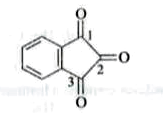Which of the given compounds is most reactive towards addition of HCL.
Propene
Propyne
But-1-yne
But-2-yne
To determine which compound is most reactive towards the addition of HCl, we need to analyze the stability of the carbocations formed during the reaction. The more stable the carbocation, the more reactive the compound will be.
1. Identify the Compounds: The compounds given are:
- Propene (C3H6)
- Propyne (C3H4)
- But-1-ine (C4H6)
- But-2-ine (C4H6)
2. Understand the Reaction: When these compounds react with HCl, they undergo an electrophilic addition reaction where HCl adds across the double or triple bond. The first step involves the formation of a carbocation.
3. Carbocation Formation:
- Propene (CH3-CH=CH2):
- Forms a secondary carbocation (CH3-CH^+-CH3) when H adds to the terminal carbon.
- Stability: Secondary carbocation (more stable due to hyperconjugation).
- Propyne (CH3-C≡CH):
- Forms a primary carbocation (CH3-C^+-CH2) when H adds to the terminal carbon.
- Stability: Primary carbocation (less stable).
- But-1-ine (CH3-CH2-C≡CH):
- Forms a secondary carbocation (CH3-CH2-C^+-CH2) when H adds to the terminal carbon.
- Stability: Secondary carbocation (more stable).
- But-2-ine (CH3-C≡C-CH3):
- Forms a secondary carbocation (CH3-C^+-C-CH3) when H adds to one of the middle carbons.
- Stability: Secondary carbocation (more stable).
4. Evaluate Carbocation Stability:
- Propene has a secondary carbocation with 6 hyperconjugating structures due to 6 alpha hydrogens.
- Propyne has a primary carbocation with 5 alpha hydrogens, leading to less stability.
- But-1-ine has a secondary carbocation with 4 alpha hydrogens.
- But-2-ine has a secondary carbocation with 4 alpha hydrogens.
5. Conclusion:
- The most stable carbocation is formed from propene due to the highest number of hyperconjugating structures (6), making it the most reactive towards HCl.
- Therefore, the answer is Propene (Option 1).
- Propene (C3H6)
- Propyne (C3H4)
- But-1-ine (C4H6)
- But-2-ine (C4H6)
- Propene (CH3-CH=CH2):
- Forms a secondary carbocation (CH3-CH^+-CH3) when H adds to the terminal carbon.
- Stability: Secondary carbocation (more stable due to hyperconjugation).
- Propyne (CH3-C≡CH):
- Forms a primary carbocation (CH3-C^+-CH2) when H adds to the terminal carbon.
- Stability: Primary carbocation (less stable).
- But-1-ine (CH3-CH2-C≡CH):
- Forms a secondary carbocation (CH3-CH2-C^+-CH2) when H adds to the terminal carbon.
- Stability: Secondary carbocation (more stable).
- But-2-ine (CH3-C≡C-CH3):
- Forms a secondary carbocation (CH3-C^+-C-CH3) when H adds to one of the middle carbons.
- Stability: Secondary carbocation (more stable).
- Propene has a secondary carbocation with 6 hyperconjugating structures due to 6 alpha hydrogens.
- Propyne has a primary carbocation with 5 alpha hydrogens, leading to less stability.
- But-1-ine has a secondary carbocation with 4 alpha hydrogens.
- But-2-ine has a secondary carbocation with 4 alpha hydrogens.
- The most stable carbocation is formed from propene due to the highest number of hyperconjugating structures (6), making it the most reactive towards HCl.
- Therefore, the answer is Propene (Option 1).
Topper's Solved these Questions
Similar Questions
Knowledge Check
Which of the following compounds is most reactive towards nucleophilic addition reactions ?
ACH3−O∣∣C−HBCH3−O∣∣C−CH3C D
D
Which of the following compounds is most reactive towards nucleophilic addition reactions ?
ACH3−O∣∣C−HBCH3−O∣∣C−CH3C D
D
Which of the following compounds is most reactive towards nucleophilic addition reactions ?
ACH3−O∣∣C−HBCH3−O∣∣C−CH3C D
D
Which of the folliwng compounds is the most reactive towards electrophilic substitution reaction?
View SolutionWhich of the following compounds is most reactive towards nucleophilic addition reactions ?
View SolutionWhich one of the following is most reactive towards water?
View SolutionWhich carbonyl group of the given compound is most reactive for nucleophilic addition reaction?

View SolutionWhich of the following is most reactive towards aqueous NaOH?
View Solution
